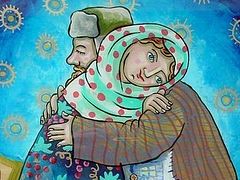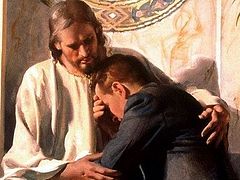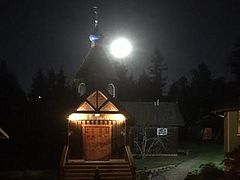 Photo: Valaam Monastery website.
Photo: Valaam Monastery website.
In the Name of the Father, and of the Son, and of the Holy Spirit!
“Forgive me…” Such easy, simple words! It doesn’t even take a deep breath to say them. It took mankind so many generations, tears, sins and so much suffering to respond to the call for repentance by the Holy Prophet and Forerunner John, the Baptist of the Lord, with the words: “Forgive me, O Lord!” and enter the waters of the Jordan.
So many abominable, loathsome and unworthy things in the life of each of us had to happen so that we could say those words; so that we could stand before God in humility and not with dignity; so that we could stand before Him not in vainglory, but conscious of the fact that we are absolutely unworthy of the place that the Lord has given us. So much had to happen in the life of each of us so that this very thought could come into our minds. And we often need to go through so many trials and overcome so many things to be able to address these words to both God and people. How difficult it can be to utter these two short words. And to do it not just formally but as the observance of a firm Church rule.
All those standing here know that all of us come to one another in our monastery every day to ask each other’s forgiveness. But how often these words are perceived by us as an element of a rite that is so familiar to us and in essence mean nothing to us. We very seldom come up to icons of the Savior, the Theotokos, to saints’ relics or to priests and say these words—“Forgive me!”—truly realizing that if they don’t forgive us, then God won’t forgive us either. This is precisely what we hear in the Gospel, including today’s Gospel reading. So little is demanded of us so that we enter the Heavenly Kingdom. So little is needed for the Lord to open the doors that were once closed to us by our sins.
Many of us present began to live the religious life in adulthood. I believe most of us cannot boast of the purity of our lives before and maybe even after our integration into church life. Standing in front of other people, we are often aware that what we did to them, whether by word or deed, can never be erased from our biographies. These acts have been engraved in our biographies just as the Ten Commandments were inscribed on the tablets of stone when they were given to Moses on Mount Sinai. And even kind words cannot erase these facts of our biographies from our lives. But as soon as we say these words, they seem to blend with the words of God which the Lord uttered neither from the height of the glory of His Kingdom nor from the height of the Divine Throne, but when He was nailed, humiliated, betrayed, and crucified on the cross. It is only participation in the same Passion of Christ and the very compassion for people that the Lord showed on the cross that give us a right to say the words that Christ said from the cross: “Forgive them”, “I forgive you”.
We are often unconscious of this, and there are two reasons for this. Sometimes we feel as if our sins were so grave that we have no right to say these two simple words. Thinking this way, we belittle the mercy of God. But in many cases we need to make strenuous efforts to cultivate contrition. But before we perform the work of repentance all that happens in the life of each of us seems fleeting: we think it is a trifle that we have thought, done something or even hurt somebody. We will come, talk about this, and the problems will disappear. Or we won’t even remember this and at best one day will mention it at confession as an unknown sin…
So often the sins that we once didn’t bother to remember later fall into the category of “unknown sins”. The things that often fall into this category once simply didn’t wound us because we had once again betrayed God and betrayed somebody who had shown us the image of God, somebody who (each in his own way) trusted us despite everything, was close to us, supported us within the bounds of his love, kindness and mercy, and did all his best to help us feel not alone. And thus, having treated this person dishonestly, sinfully, with passion, brusquely or rudely, we don’t really feel that at that moment by insulting that person we also plunged yet another nail and thrust yet another spear into the Body of Christ—the most precious creation of God.
I will relate a short story to you in the hope that it will make each of us understand how remorseful a truly sincere, pure heart feels, unable to forgive itself for the things that are simply ignored by the hearts hardened by sins.
One day a very young woman, in fact a girl, came to Pukhtitsa Dormition Convent.[1] She was an orphan and was sheltered by the sisters. The abbess took special care of her. The girl spent most of her time with her, and the girl’s and later the young woman’s formation as a personality took place before the abbess’s own eyes. Looking at this girl (without hearing her confession) was enough to understand what a pious and pure life, free of any sins or passions, she led. And how beautiful was the beginning of that human life and how different it was from the lives of many of us. When the girl grew up, the question was considered of tonsuring her a nun. But when the abbess told her that she wanted to have her tonsured, this inspiring soul suddenly became gloomy, threw herself before the abbess on her knees, burst into tears and said: “I cannot accept this. I have too many secret, unrevealed sins...” One sin, “the most terrible one”, stood out.
The abbess was astonished because all she knew about this girl—her character and her life demonstrated that she was absolutely unable to taint herself by anything not only by deed but even in her mind. But the girl persistently refused to be tonsured a nun and was very frightened to disclose the sin she had committed. But when at last the abbess by the virtue of her authority persuaded the girl to confess her sin, the latter led her up to the attic of her cell where there were dolls… This girl’s “sin” was in the fact that she would play with dolls. And she believed that it made her completely unfit for monastic life. If we compare this self-condemnation of a pure human soul with what happens in our lives we will see that far more serious things usually don’t even worry us at all.
Today is the day when we can open not only the gates of repentance but also the gates of the Kingdom of Heaven for ourselves. And it is not a day when we can enjoy good food for the last time. It is such a pity that the period that the Church piety declared as the preparatory weeks for the beginning of Lent is frequently associated with food alone in our consciousness. While a gradual abandonment of some kinds of food is designed to prepare our bodies for the first and the strictest days of Lent, we perceive it as our last chance to satiate ourselves and entertain ourselves with delicacies. And now the Lord is giving us this last day, the final few hours to get ready and then turn first to people and then to God Himself with these two words which are pronounced so easily: “Forgive me!”
We can be absolutely certain that if we spend these several hours in surfeit, in the desire to gobble up what is inside our refrigerators and prevent any food from wasting and rotting so that we can live through the next few weeks with the taste of our favorite dishes in our minds, then when we enter this church in four, five or six hours’ time we won’t be able to say these words from the bottom of our hearts—because we didn’t live by them. He who has experienced the genuine pain of seeing himself as a traitor of both God and man knows how this awareness of sin discourages us from thinking about anything else, let alone about food. St. John of Kronstadt used to say that “a full stomach is deaf to prayer”. We will stand together through these few hours, and what will we bring each other? We are standing here now, and in a few hours’ time we will all gather again to ask each other’s forgiveness. Will there be anything in our hearts for which we will want to be forgiven by somebody else? Will we see this person as the only path to our salvation? “God won’t forgive me unless you forgive me…”
The Church calls the Lenten period the “spiritual spring”. A few people will pass by and the ice that separates our monastery [Valaam Monastery.—Trans.] from the mainland will thaw. I wish to each of you that this Lenten spring season may melt the ice in our souls, the ice that separates us from all those we call our brothers and sisters. Greetings with the feast!



